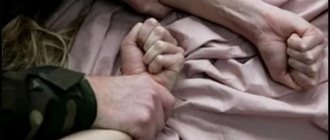Criminal Code of the Russian Federation in the latest edition:
Article 97 of the Criminal Code of the Russian Federation. Grounds for applying compulsory medical measures
1. Compulsory medical measures may be imposed by a court on the following persons:
a) who committed acts provided for in the articles of the Special Part of this Code in a state of insanity;
b) who, after committing a crime, have developed a mental disorder that makes it impossible to impose or carry out punishment;
c) who have committed a crime and suffer from mental disorders that do not exclude sanity;
d) has become invalid. — Federal Law of December 8, 2003 N 162-FZ;
e) who, at the age of over eighteen, have committed a crime against the sexual integrity of a minor under fourteen years of age, and who suffer from a disorder of sexual preference (pedophilia), which does not exclude sanity.
2. Persons specified in part one of this article are prescribed compulsory medical measures only in cases where mental disorders are associated with the possibility of these persons causing other significant harm or danger to themselves or other persons.
3. The procedure for the execution of compulsory measures of a medical nature is determined by the criminal executive legislation of the Russian Federation and other federal laws.
4. In relation to the persons specified in paragraphs “a” - “c” of part one of this article and who do not pose a danger due to their mental state, the court may transfer the necessary materials to the federal executive body in the field of healthcare or the executive body of the constituent entity of the Russian Federation in in the healthcare sector to resolve the issue of treating these persons in a medical organization providing psychiatric care, or sending these persons to inpatient social service institutions for persons suffering from mental disorders, in the manner established by legislation in the field of health care.
Return to the table of contents of the document: Criminal Code of the Russian Federation in the latest edition
Definition of the concept of “compulsory medical measures”
Compulsory measures of a medical nature are measures of state coercion applied by the court to persons suffering from mental disorders if they commit a socially dangerous act prohibited by criminal law.
Medical measures are coercive, as they are applied regardless of the wishes or unwillingness of the sick person, his relatives or loved ones, and also entail a restriction of certain rights and freedoms of the patient.
We will also provide more detailed definitions of the concept of compulsory medical measures.
Compulsory measures of a medical nature can be characterized as measures of state coercion based on criminal and criminal procedural law, applied by court decision to a person who has committed a socially dangerous act in a state of insanity as provided for in the Special Part of the Criminal Code of the Russian Federation or who, after committing a crime, has developed a mental disorder that makes it is impossible to assign a punishment (its execution), as well as to a person who has committed a crime and suffers from a mental disorder that does not exclude sanity, provided that the mental disorder of such a person is associated with the possibility of causing him other significant harm or with a danger to himself or other persons, and those who place a mentally ill person in a medical organization that provides psychiatric care in an inpatient setting, of a general type, a specialized type or a specialized type with intensive supervision, in order to limit society from committing a repeated socially dangerous act, protecting the safety of the person of the patient himself and introducing him to the conditions of compliance with the rules public order.
In paragraph 2 of the Resolution of the Plenum of the Supreme Court of the Russian Federation dated 04/07/2011 N 6 “On the practice of using compulsory measures of a medical nature by courts” the following definition of the concept of “compulsory measures of a medical nature” is given:
“ Compulsory measures of a medical nature are measures of a criminal legal nature and are applied only to persons who have committed a socially dangerous act provided for by criminal law in a state of insanity or who, after committing a crime, have developed a mental disorder that makes it impossible to impose a punishment or its execution, as well as to persons who have committed a crime and suffer from mental disorders that do not exclude sanity, and only if the mental disorder is associated with the possibility of these persons causing other significant harm or danger to themselves or other persons (parts 1 and 2 of Article 97 of the Criminal Code of the Russian Federation). At the same time, the goals of applying compulsory measures of a medical nature differ from the goals of applying punishment and, by virtue of Article 98 of the Criminal Code of the Russian Federation, are to cure or improve the mental state of these persons, as well as to prevent them from committing new socially dangerous acts provided for by criminal law.”
Thus, persons, although suffering from certain mental disorders, but who have committed offenses that do not contain signs of a crime, or who have not committed any offenses at all, cannot be subject to the use of compulsory medical measures.
Possible court decisions
If the accused does not pose a danger to others and is considered incompetent, then the case may be transferred to a psychological dispensary or other specialized institution, where compulsory treatment will be carried out. Here are several methods of medical influence that are regulated by law:
- outpatient compulsory observation and treatment with a psychiatrist;
- forced stay in a general hospital;
- stay in a specialized hospital;
- placement in a specialized hospital with intensive observation.
The judge reads the verdict
It is worth considering in more detail when which method of compulsory treatment is prescribed by the court.
Table 2. Features of different types of compulsory treatment
| Type of treatment | Short description |
| Ambulatory | If mental disorders do not require constant supervision. It is necessary to visit a doctor periodically. If a citizen does not show up for an appointment, the doctor passes the information to the police. Then they can change the sentence and force you to stay in a hospital. |
| In a general hospital | Punishment is imposed on persons who require constant medical supervision. At the same time, a citizen may not pose a danger to society, but due to an unstable psycho-emotional background, he requires special attention. |
| In a specialized hospital | The patient requires constant attention and may pose a danger to society. Allowed to be in custody. Staying in this hospital involves the use of stronger psychotropic medications. |
| An intensive course of therapy in a specialized hospital | Prescribed for persons who pose a particular danger. The goal is to reduce the level of danger and stabilize the psycho-emotional background. |
According to the provisions of the current legislation, the preventive measure may be changed if the patients are rehabilitated or their health has improved. For example, it is possible to transfer from hospital to outpatient treatment. Rehabilitation means that a citizen has gotten rid of his mental problem and can live in society without posing a danger to him.
Important! During therapy, doctors are responsible for the life and health of the patient. They must prevent suicide or self-harm. They are also charged with the obligation to prevent negative influence from third parties.
Compulsory medical measures and criminal penalties. Similarities and differences
Compulsory measures of a medical nature are measures of state coercion that are superficially similar to criminal punishment. They are put into action in connection with the commission of socially dangerous acts (or crimes committed by persons specified in Article 22 of the Criminal Code of the Russian Federation), are applied by court decision, and are associated with the restriction of the rights of citizens. Their use is associated with significant restrictions on constitutional rights and legally protected interests, primarily the right to freedom and personal integrity. They can also be classified as measures of a criminal law nature by the fact that they are appointed on behalf of the state and only by the court.
Meanwhile, criminal punishment and coercive measures of a coercive nature are completely different legal phenomena, differing in their content, grounds, goals, order of application and termination.
Compulsory medical measures are not criminal penalties; they are a means of protection against socially dangerous acts of mentally ill persons.
Compulsory medical measures in their content are medical measures that are applied only to persons suffering from mental disorders. They represent a system of psychotherapeutic, medical-preventive and medical-rehabilitation measures, as well as a system of medical measures for the care and supervision of mentally ill people.
The measures under consideration are being implemented not in the system of institutions executing punishment, the Ministry of Justice of the Russian Federation, but in medical organizations of the state health care system that provide psychiatric care.
Compulsory measures of a medical nature do not contain an element of punishment and deliberate infliction of suffering, and do not express a negative assessment of socially dangerous actions and persons suffering from mental disorders themselves. These measures are not aimed at correcting and restoring social justice, are not prescribed for a specific period, and the duration of their use depends primarily on the nature and severity of the mental disorder. Unlike punishment, the court does not determine the duration of such measures, since it is impossible to determine in advance the period necessary for recovery or improvement of a person’s mental health.
Compulsory treatment as a measure of criminal law must be distinguished from involuntary hospitalization according to the conclusion of psychiatrists, from compulsory treatment in a medical organization providing psychiatric care in an inpatient setting by a judge’s order to persons who have not committed a socially dangerous act, issued in accordance with the Law about psychiatric care.
The procedure for the execution of compulsory measures
Article 97 of the Criminal Code of the Russian Federation regulates the procedure for applying executive measures based on the type of prescribing forcible medical influence. In addition to this legislative provision, this issue is also regulated by other regulatory and legal documents of federal importance.
Coercive measures are prescribed as the main or additional punishment. Everything here will depend on the severity of the crime. If the court finds that the offender has committed criminal acts of a light or medium level, then compulsory treatment will be prescribed as the main punishment. If the offender committed actions that entailed the creation of a particularly dangerous social situation, then in this case this measure will be additional, and the main punishment will be established in proportion to the provisions of the Criminal Code of the Russian Federation. The only exceptions here will be minor citizens and persons who are not responsible for their actions due to the presence of serious mental illnesses.
Grounds for applying compulsory medical measures
The grounds for applying compulsory medical measures are determined by a combination of legal and medical criteria.
The legal criterion is that the grounds, goals, types, procedure for application and termination of these measures are determined by the Criminal Code of the Russian Federation. The procedure for their appointment is regulated by the Criminal Procedure Law (Code of Criminal Procedure of the Russian Federation). In relation to specific persons who have committed crimes, they are appointed by the court. The court also considers further decisions on the extension, modification and termination of compulsory measures.
The medical criterion of these measures is determined by the fact that their content, types, conditions of appointment, modification and termination depend on the mental state of the person to whom they are applied. Recommendations on the use of compulsory measures are given by psychiatrists, including conclusions about the diagnosis of the disease, insanity or limited sanity, the prescription and implementation of treatment and prevention of mental disorders, as well as the necessary social rehabilitation measures.
The immediate legal basis for the application of the medical measures in question is:
- commission of a socially dangerous act, provided for by the Criminal Code of the Russian Federation, in a state of insanity by persons suffering from mental disorders;
- the commission of a crime by persons who, after committing it, developed a mental disorder that makes it impossible to assign or execute punishment, or who suffer from mental disorders that do not exclude sanity.
The difference between these grounds is significant. Recognition of a state of insanity at the time of committing a socially dangerous act means the unconditional release of such a person from criminal liability. The onset of a mental disorder after committing a crime does not exclude the subsequent bringing of such a person to criminal liability in the event of his recovery within the terms of criminal prosecution.
Law on Proceedings on the Application of Compulsory Treatment
According to current legislation, forced treatment or other methods of medical intervention are allowed if this is necessary to obtain additional evidence. Compulsory treatment is also considered one of the forms of punishment.
The Criminal Procedure Code of the Russian Federation provides for the following:
- grounds for using compulsory medical measures;
- what exactly needs to be proven;
- what is the role of a lawyer in resolving this issue;
- procedure for appealing a court decision;
- termination or change in the duration of treatment based on the patient’s health status;
- the possibility of reopening a criminal case against someone who was placed on compulsory treatment.
Extract from Article 433 of the Code of Criminal Procedure of the Russian Federation
The entire 51st chapter of the Code of Criminal Procedure of the Russian Federation considers this circumstance. It is worth studying in more detail when, who and on what grounds can place a citizen for compulsory treatment or other type of medical intervention.
Criminal Code of the Russian Federation
Who can be subject to compulsory medical measures?
The law provides for categories of persons to whom compulsory medical measures may be applied. In accordance with Part 1 of Article 97 of the Criminal Code of the Russian Federation, they can be appointed by the court to a limited circle of persons:
1). persons who have committed socially dangerous acts in a state of insanity and are subject to exemption from criminal liability. Part 1 of Art. 21 of the Criminal Code of the Russian Federation establishes a provision on the non-incurrence of criminal liability in the event that a person was in a state of insanity at the time of committing a socially dangerous act. Part 2 of the same article of the Criminal Code of the Russian Federation states that compulsory medical measures may be applied to such persons.
2). persons who have committed crimes in a state of sanity, but who, after committing the crime, have developed a mental disorder that makes it impossible to assign or carry out punishment. This category of persons, in turn, is divided into two groups.
a) The first of these includes persons who, after committing a crime, have a mental disorder that deprives them of the opportunity to realize the actual nature and social danger of their actions (inaction) or to manage them, making it impossible to assign or execute punishment. Such persons are released by the court not from criminal liability (like insane persons in the first category), but from punishment or from further serving it (Part 1 of Article 81 of the Criminal Code of the Russian Federation). Compulsory treatment is applied to them, as in relation to persons who have committed a socially dangerous act in a state of insanity. If they recover, they may be subject to criminal liability and punishment if the statute of limitations provided for in Art. Art. 78 and 83 of the Criminal Code of the Russian Federation (clause 3 of the Resolution of the Plenum of the Armed Forces of the Russian Federation dated 04/07/2011 N 6).
b) The second group includes persons who, after committing a crime, experienced a temporary mental disorder that does not allow them to resolve the issue of their sanity at the time of committing a socially dangerous act. For example, a person fell into a reactive state due to the initiation of a criminal case and the threat of punishment. In this case, he is prescribed compulsory treatment in accordance with the established procedure. When a person recovers, the case is investigated and considered in the general manner, unless the statute of limitations for criminal prosecution has expired. If such a mental disorder occurs while serving a sentence, compulsory medical measures may also be applied to such a person. After treatment, such persons are sent to a correctional institution to continue serving their sentence, unless the statute of limitations for execution of the sentence has expired. In the event of the onset of a temporary mental disorder after the commission of a crime, the issue of releasing a person from criminal liability is not resolved, and the court decision must indicate that these measures are prescribed until the person recovers from the painful state with his subsequent referral for examination to resolve diagnostic and expert issues.
3). persons who have committed a crime and suffer from mental disorders that do not exclude sanity . This category of persons is assigned a criminal sentence, which is carried out in accordance with the general procedure, and compulsory treatment is carried out simultaneously with serving the sentence. Upon completion of the sentence, such compulsory treatment ceases.
4). persons who, over the age of 18, have committed a crime against the sexual integrity of a minor under 14 years of age, and who suffer from a disorder of sexual preference (pedophilia), which does not exclude sanity. The application of PMMH to these persons can be continued after serving the sentence.
Rights of the accused's representative
The representative of the accused may be a guardian or trustee appointed by the court. These are also other persons who are considered close relatives and who care for the citizen. In this case, it is necessary to have a corresponding resolution from the employees of the guardianship department on the opportunity to represent the interests of the incapacitated citizen. Here are his rights, which are provided for by the Code of Criminal Procedure of the Russian Federation:
- receive information about the charges brought forward, the evidence base about other materials of the investigation;
- participate in various activities in relation to the accused (permission from the investigator or prosecutor is required);
- get acquainted with protocols, petitions and other materials in order to study the accuracy and completeness of the information;
- study the materials of the criminal case after the preliminary investigation;
- receive copies of petitions and appealed decisions in the manner established by the Code of Criminal Procedure of the Russian Federation.
Extract from Article 436 of the Code of Criminal Procedure of the Russian Federation
The legal representative himself signs all documents for the accused. At the same time, he has the right to independently defend him during the trial.
Imposition of coercive measures on a person whose mental state does not pose a danger
According to Part 2 of Article 97 of the Criminal Code of the Russian Federation, compulsory medical measures are prescribed not in all cases of a socially dangerous act committed by a person suffering from mental disorders, but only in cases where these mental disorders are associated with the possibility of these persons causing something else (in addition to the socially dangerous act committed) significant harm or danger to oneself or other persons, i.e. when these persons pose a danger not only to themselves, but also to others.
The danger of a person to himself or other persons or the possibility of this person causing other significant harm may be indicated by the nature of the mental disorder, confirmed by the findings of a forensic psychiatric examination, his tendency in this regard to commit violent acts against other persons or to cause harm to himself , to commit other socially dangerous actions (seizure of other people’s property, arson, destruction or damage to property in other ways, etc.), as well as the physical condition of such a person, taking into account which the possibility of realizing his socially dangerous intentions is assessed (clause 17 of the Resolution of the Plenum of the Supreme Court of the Russian Federation dated April 7, 2011 No. 6 “On the practice of using compulsory measures of a medical nature by courts”).
The Determination of the Constitutional Court of the Russian Federation dated November 17, 2009 N 1531-О-О contains the following legal position:
“Current criminal and criminal procedural laws directly state that compulsory medical measures are prescribed only in cases where a person’s mental disorder is associated with a danger to him or other persons or the possibility of causing him other significant harm (Part 2 of Article 97 of the Criminal Code of the Russian Federation and part 2 of article 433 of the Code of Criminal Procedure of the Russian Federation). Moreover, if a person does not pose a danger due to his mental state or has committed an act of minor gravity, then the court issues a decision to terminate the criminal case and refuse to apply compulsory medical measures; at the same time, the court decides the issue of canceling the preventive measure (part 2 of article 433 of the Code of Criminal Procedure of the Russian Federation). Thus, the provisions of Chapter 51 of the Code of Criminal Procedure of the Russian Federation, acting in systematic connection with the relevant provisions of the criminal law, do not imply the ability of the court to arbitrarily apply compulsory measures of a medical nature, including in relation to persons who, due to their mental state, do not pose a danger to themselves and others persons."
In relation to persons suffering from mental disorders, but who do not pose a danger due to their mental state, in accordance with Part 4 of Art. 97 of the Criminal Code of the Russian Federation, the court may transfer the necessary materials to the federal executive body in the field of health care or the executive body of the constituent entity of the Russian Federation in the field of health care to resolve the issue of treating these persons in a medical organization providing psychiatric care, or sending these persons to inpatient social service institutions for persons suffering from mental disorders, in the manner established by legislation in the field of health protection.
At present, the possibility of imposing compulsory medical measures on persons who have committed a crime and are recognized as in need of treatment for alcoholism and drug addiction is excluded, since such provisions of the law contradict the principles of voluntary treatment of persons who do not suffer from severe mental disorders, and also because the practice of prescribing such treatment showed its ineffectiveness.
Proceedings on the application of coercive measures
Proceedings on the application of compulsory medical measures are carried out on the basis of the provisions of Chapter. 51 Code of Criminal Procedure of the Russian Federation. When deciding on the application of a compulsory measure of a medical nature, the court must resolve the issues listed in Art. 442 of the Code of Criminal Procedure of the Russian Federation.
Having found it proven that an act prohibited by criminal law was committed by a given person in a state of insanity or that after committing a crime this person developed a mental disorder that makes it impossible to impose punishment or its execution, the court makes a decision to release this person from criminal liability or from punishment and on the application of compulsory medical measures against him, indicating a specific measure.
Procedural specifics of the preliminary investigation
It is necessary to fully comply with all procedural rules so that the defense does not have any claims. Any violation shall be considered grounds for filing a motion to challenge the enforcement order. Here are a few important nuances that you should know about.
- Article 434 of the Code of Criminal Procedure of the Russian Federation states that it is necessary to conduct a preliminary investigation with the use of specialized means and medical personnel if the accused claims to admit that he is insane or admits the presence of a state of passion during the commission of a crime.
- During the preliminary investigation, it is necessary to answer several questions: the time, place and method of committing the illegal act, whether the accused really committed the crime, what degree of harm, whether the accused has mental disorders and whether they can pose a danger to society. Failure to answer one of the questions does not allow the citizen to be convicted.
- If the accused has mental problems, then he may be forcibly placed in a psychiatric dispensary on the basis of the provisions of Articles 108 and 435 of the Code of Criminal Procedure of the Russian Federation. If the accused is not in custody, then Article 203 of the Code of Criminal Procedure of the Russian Federation is applied for placement in compulsory treatment.
- The specifics of separating a criminal case are provided for in Article 436 of the Code of Criminal Procedure of the Russian Federation. It is permissible to conduct a case in a special manner if one of the accomplices suffered from mental disorders or developed them after committing an unlawful act.
- Article 437 of the Code of Criminal Procedure of the Russian Federation gives the right to defense during the consideration of such cases. It is also possible for a legal representative to participate during the trial if the accused is declared incompetent. It is worth noting that according to Article 438 of the Code of Criminal Procedure of the Russian Federation, the participation of a lawyer is mandatory. It is provided free of charge if the accused cannot afford to hire him commercially.
- Article 439 of the Code of Criminal Procedure of the Russian Federation stipulates that after a preliminary investigation, the investigator or prosecutor must make an appropriate decision to terminate the criminal case or send it to court.
Extract from Article 434 of the Code of Criminal Procedure of the Russian Federation
Thus, one cannot simply assign medical intervention instead of criminal punishment. This requires appropriate medical indications. At the same time, the period of stay in the hospital can be extended as necessary based on the conclusion of the doctors.
Mandatory treatment for convicts serving imprisonment
In relation to persons suffering from mental disorders that do not exclude sanity, not only compulsory medical measures can be applied, but also compulsory treatment , which is applied, if there are grounds for this, in relation to convicted persons serving a sentence of imprisonment.
So, in accordance with Part 1 of Art. 18 of the Penal Code of the Russian Federation, those sentenced to arrest, imprisonment, suffering from mental disorders that do not exclude sanity, by institutions executing these types of punishments, are subject to compulsory medical measures by court decision.
If the presence of such disorders is revealed during the serving of the above types of punishments and it is established that the condition of the convict is associated with a danger to himself or other persons, the administration of the institution executing these types of punishments sends to the court a submission on the application of compulsory medical measures to such convict character.
To convicts serving arrest or imprisonment, and those suffering from alcoholism, drug addiction, substance abuse, HIV-infected convicts, as well as convicts suffering from an open form of tuberculosis or who have not completed the full course of treatment for a sexually transmitted disease, the institution executing these types of punishments, by decision of the medical commission applies mandatory treatment.
How to appeal a court decision on compulsory medical treatment
You need to understand how to properly file an appeal if the judge’s decision does not suit one of the parties. It must be provided immediately to a higher authority or to the same one. The latter case involves studying the details and transferring the case further independently by employees of the court office. This is what must be included in the appeal:
- the name of the court where the appellant is applying;
- Full name of the judge who made the decision, as well as the case number;
- Full name of the applicant;
- the text of the appeal, which indicates the main provisions that were violated when making the decision (must be legally justified);
- the appellant's claims;
- date and signature.
Lawyer draws up an appeal
It is worth noting that the appeal is considered within the same evidence base; new papers cannot be provided. If for some reason the judge of the first instance rejected the opportunity to attach some materials to the case, then they can be submitted for consideration by the judge of the next instance. This is relevant if the information could significantly change the verdict.
Criminal punishment for an insane citizen
According to the provisions of the Code of Criminal Procedure of the Russian Federation, a citizen is placed on compulsory treatment if he has obvious mental disorders. In this case, the period of stay in the hospital is counted as the time of serving the sentence. This is recorded in Article 103 of the Criminal Code of the Russian Federation. In this case, it is possible to transfer the case to the court again after the rehabilitation of the convicted person. Necessary:
- Prove that the patient has been rehabilitated and has gotten rid of his mental problem. To do this, it is worth doing a forensic examination again.
- Re-initiate a criminal case and review the preventive measure.
- Choose as a preventive measure imprisonment or another type of punishment that is provided for the commission of a specific illegal act.
Thus, after rehabilitation, you will have to spend the remaining time in prison, colony or other correctional institution, according to the court decision. If a party does not agree with the judge's decision, an appeal can be filed.
Sometimes the convicted person does not agree with rehabilitation and may require a second medical examination in a private clinic that has been accredited. The court can reject this request only if there is a violation of procedural rules, an incorrect document is drawn up, or there is no need for re-examination.
Additionally, it is possible to listen to the opinions of experts and doctors who worked with the convicted person. They will tell you how he underwent treatment and what stage he was at at a particular time. Doctors will be able to tell whether there is a risk of relapse and whether there are any consequences of treatment that may interfere with the execution of punishment according to the Criminal Code of the Russian Federation. A comprehensive study of the patient's mental and emotional state is required in order to change the court verdict on compulsory treatment.
Thus, a judge may decide on the need for compulsory medical influence on a citizen if the accused was in a state of passion or has mental disabilities. The duration of therapy depends on the specific case, so it is impossible to immediately say how long it will take to be treated. Sometimes this period is longer than the time spent in prison while serving a sentence under the Criminal Code of the Russian Federation.







